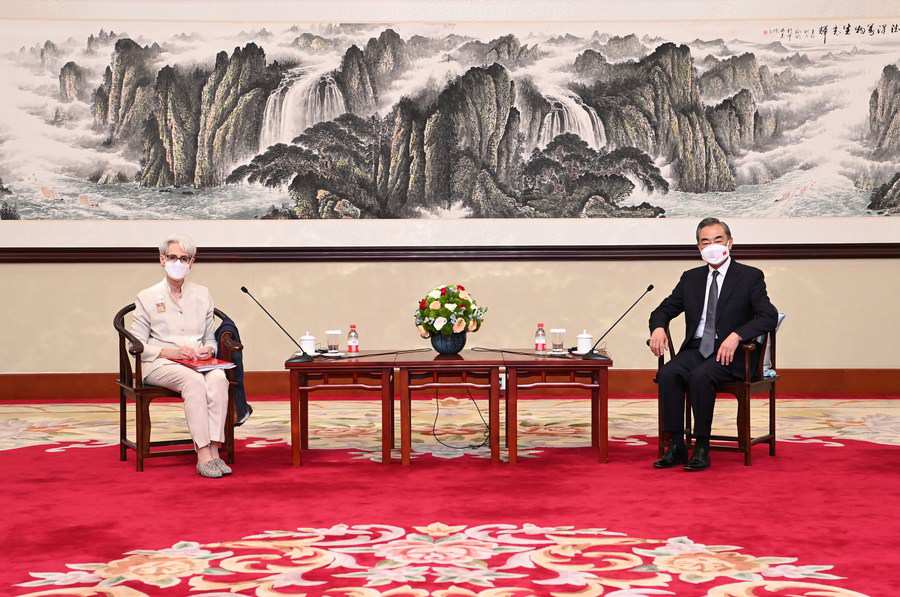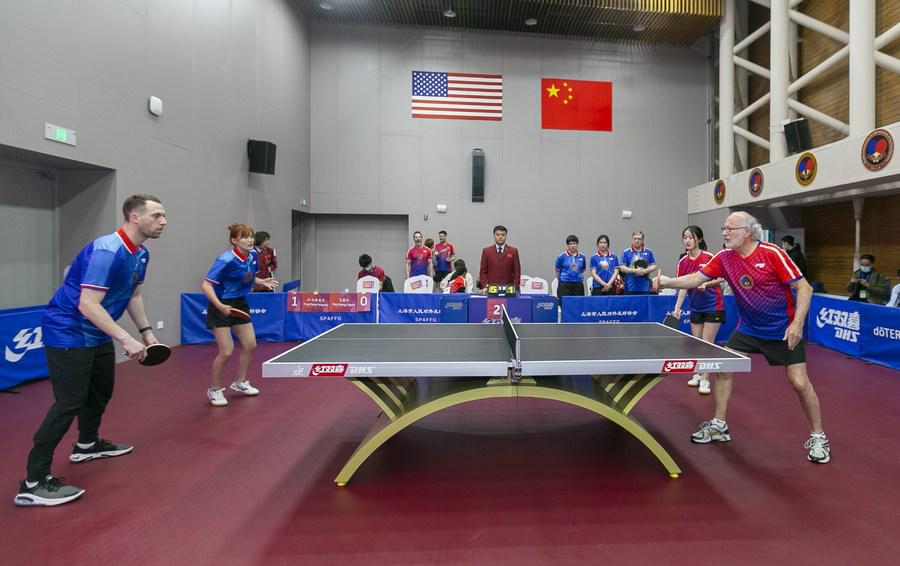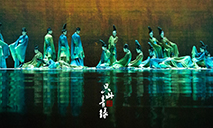U.S., China should not go for misunderstanding, misjudgement: Chinese ambassador

File photo shows China's new Ambassador to the United States Qin Gang making remarks to Chinese and U.S. media upon arrival in the United States on July 28, 2021. (Xinhua/Liu Jie)
"As two major countries with different political systems, cultures and development stages, we must find a way to get along in peace based on mutual respect," said Chinese Ambassador to the United States Qin Gang.
WASHINGTON, Sept. 1 (Xinhua) -- China and the United States "should not go for misunderstanding, misjudgment, conflict or confrontation" as their relations have come to another historical juncture, said Chinese Ambassador to the United States Qin Gang on Tuesday.
"We should not miss historical opportunities. More importantly, we should not make historical mistakes," Qin said in his speech at the Welcome Event by the National Committee on U.S.-China Relations (NCUSCR) Board of Directors.
"Instead, we need to face up to the reality and trend of the times, return to rationality, take a responsible attitude to history, to the two peoples and to the world, and keep to the right direction of China-US relations," he said.
"As two major countries with different political systems, cultures and development stages, we must find a way to get along in peace based on mutual respect," he said.

Chinese State Councilor and Foreign Minister Wang Yi (R) meets with U.S. Deputy Secretary of State Wendy Sherman in north China's Tianjin on July 26, 2021. (Xinhua/Li Ran)
First, the two sides should be clear about each other's bottom lines and show mutual respect, said the ambassador.
During his meeting with U.S. Deputy Secretary of State Wendy Sherman in the northern Chinese city of Tianjin, Chinese State Councilor and Foreign Minister Wang Yi marked out China's "three bottom lines."
"They are all about China's core interests. The Chinese side also put forward 'two lists' to the U.S. side: a list of U.S. wrongdoings and a list of individual cases of China's concern. The lists are symptoms, and the bottom lines point to the root causes," said Qin.
He hoped that the U.S. side will exercise caution on issues concerning Taiwan, Hong Kong, Xinjiang, Tibet and the South China Sea, respect China's sovereignty, security and development interests, stop interfering in China's internal affairs, and avoid touching or challenging China's red line.

Players from China and the United States take part in a friendly match to commemorate the 50th anniversary of the Ping-Pong Diplomacy between China and the United States at the International Table Tennis Federation Museum in Shanghai, east China, April 10, 2021. (Xinhua/Wang Xiang)
Second, the two sides should maintain dialogue and manage differences, the ambassador said.
The two countries need to follow through on the spirit of the phone conversation between Chinese President Xi Jinping and U.S. President Joe Biden on the eve of the Chinese Lunar New Year, strengthen communication between the departments of foreign affairs, economy, finance, law enforcement and the military, rebuild related dialogue mechanisms, and properly manage and handle differences in a constructive way, he said.
Third, the two sides should remove disturbances and focus on cooperation, said Qin.
"At the bilateral level and on global issues such as climate change, we can build up small steps and address easier problems first, so as to find the entry point to improve our relations and expand cooperation. At the same time, we need to jointly remove obstacles to cooperation," he said.
"It is hoped that the U.S. will stop political manipulation on the origins tracing of the virus and stop deliberating and passing China-related bills that will seriously hijack China-U.S. relations," he said.
"There is a long way to go to improve and develop China-U.S. relations. The historical mission of upholding and promoting our relationship in the new era has come to us," said Qin.

Photo taken on March 30, 2021 shows an exterior view of the World Health Organization (WHO) headquarters in Geneva, Switzerland. (Xinhua/Chen Junxia)
Serving as Chinese Ambassador to the United States at this time, he said he will enhance communication and dialogue with various sectors of the United States, act as a bridge and bond between the two countries, and work to build a more rational, stable, manageable and constructive China-U.S. relationship.
"I look forward to working together with the National Committee towards this goal," he said.
Members of the NCUSCR Board of Directors extended a warm welcome to the ambassador during the event and said the Committee will continue to work to enhance mutual understanding, mutual trust and cooperation between China and the United States, so as to boost the development of constructive relations between the two countries.
Participants of the event included former U.S. Secretary of State Henry Kissinger, Chairman of the Board of Directors and former Treasury Secretary Jacob Lew, Honorary Chairman of the Board of Directors and former Trade Representative Carla Hills and President of the Committee Stephen Orlins.
Photos
 Dance show saluting traditional culture of the Song Dynasty makes its debut
Dance show saluting traditional culture of the Song Dynasty makes its debut Village in SW China’s Yunnan embraces prosperity through agricultural tourism
Village in SW China’s Yunnan embraces prosperity through agricultural tourism Eighth birthday for pair of giant pandas celebrated in Haikou, Hainan province
Eighth birthday for pair of giant pandas celebrated in Haikou, Hainan province Olympic gold medalists portrayed in Shanxi artist’s polymer clay sculptures
Olympic gold medalists portrayed in Shanxi artist’s polymer clay sculptures
Related Stories
- Applying "Cold War playbook" to today's China-U.S. relations absurd, dangerous: Chinese ambassador
- China demands U.S. revoke offer of reward in "drugs" case
- Chinese, U.S. climate envoys to hold face-to-face talks
- U.S. cannot whitewash its failure in pandemic response by smearing China: ambassador
- Digital pen pal program invigorates China-U.S. sister-city relationship
Copyright © 2021 People's Daily Online. All Rights Reserved.






